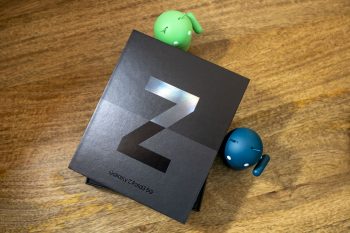
72 hours with the Galaxy Z Fold 3: Thinner, lighter, and terrible battery life
It’s been a couple of days since I’ve had my hands on the Galaxy Z Fold 3. The decision to upgrade from my existing Z Fold 2 was a rather difficult one, but this isn’t so much about comparing those two devices. Instead, we’re going to take a look at what has stood out the most in my time with the device up to this point.
The refined design
I know I said that this wasn’t going to be a straight comparison with the Z Fold 2. However, when you go from using last year’s model to the Z Fold 3, it’s really difficult to not do just that. From the instant that I took the Fold 3 out of the box, it was a stark difference in weight and overall thickness. I was instantly enamored with the Fold 3 and its matte finish, as Samsung brought the excellent Phantom Black colorway to the Z Fold 3. This felt like it was a great decision, for me at least, because phones with glossy finishes just should go the way of the headphone jack, few and far between.
The Cover Display and Main Display remain the same sizes, which is a little bit frustrating for the former. I’m still holding out hope that Samsung will “borrow” the design from the Mate X2 and offer an almost traditional cover screen. It’s fine for just doom-scrolling Twitter or quickly checking another app. But when it comes to trying to actually type on the screen, it’s just not an enjoyable experience. This leads to me unfolding the Fold 3 much more frequently than I probably would if the cover screen was just a tiny bit wider.
Cameras are cameras
If you knew me, you would know that I have a tendency of “chasing specs” or wanting the latest and greatest when it comes to smartphones. But one area that this does not apply to, as much as processing power or RAM, is the camera. And that’s actually why I’m perfectly fine (albeit annoyed) about Samsung re-using the camera system from the Z Fold 2.
Unlike the Z Flip 3, which seems to use an upgraded main sensor, all three Z Fold 3 cameras are untouched. Sure, they are packaged in a different module with new glass over top, but the cameras are just “there”. My biggest gripe isn’t that the cameras weren’t upgraded, it’s that Samsung made this decision for a phone that it is likely hoping to replace the Galaxy Note series. While sales look good, one thing that the Note series brought to the table was an improved camera system over the previous Galaxy S devices. Unfortunately, at least for now, that won’t be the case with the Fold.
Battery life is atrocious
Slimmer and lighter design means more sacrifices had to be made. The redesigned camera module was one method, and the smaller battery is the other. I’m not even going to get into the whole “where’s the fast charging” argument here. But the battery life on the Z Fold 3 is absolutely abhorrent. I’m not sure if my unit is just a dud, as I continue to see others on r/GalaxyFold boasting about more than six hours of screen-on time.
And Samsung has introduced another series of tweaks that you can go through and set up. This is called Good Guardians, but I haven’t taken the time to try and “fix” a problem out of the box. I wanted to put the Fold 3 through its paces, unadulterated, and have been met with nothing but regret. As is almost always the case with new Samsung releases, future software releases will likely help things a bit. But until then, I’ll either need to keep a charger next to me at all times, or dive into whatever series of modules Samsung has created.
Good Lock is a necessity
Okay, so I know I just subtly-complained about needing to use Good Guardians to fix the battery life on the Fold 3. But if you own a Samsung phone you MUST give Good Lock a shot. Remember the days of customizing every aspect of your phone and having complete control? Or maybe just the good ol’ days of OxygenOS? Well Good Lock its myriad of modules gets you as close to that as possible.
Truth be told, I haven’t even gone so far as to change things like the multi-tasking menu or lock screen shortcuts. Instead, I’ve been enjoying the fruits offered by Theme Park. With this module, you can FINALLY FINALLY FINALLY use third-party icons packs from the Play Store. Now I don’t have to worry about finding workarounds that *kind of* work, but not really. Instead, I just create a custom theme in Theme Park using an icon pack of my choosing and. Plus I don’t have to mess around with using Tasker profiles in order to use a third-party launcher.
There’s a lot to dive into with the Galaxy Z Fold 3, and I’m only scratching the surface. If you have any questions that you want to see in the review, drop them in the comments below.